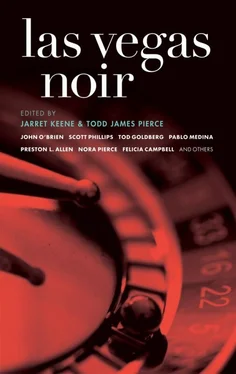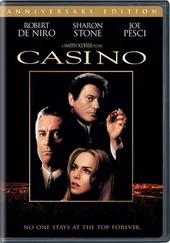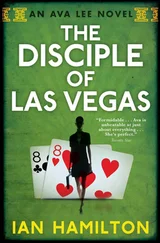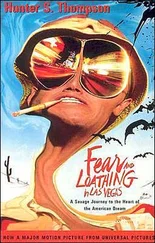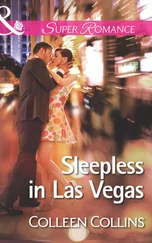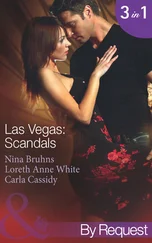Did he see the man out on the flats? Was he acting strange?
He can’t recall .
Marcus and his students spend another hour sitting around the table before the military escort returns to drive them back to the entrance, where a bus will return them to Vegas. The escort’s radio crackles on during the bus ride and he covers it with his hand. This does little to muffle the sound and the word suicide shoots like a pinball through the bus.
As soon as the kids file off the bus at the DOE and retrieve their cell phones, prohibited on the trip, they’re texting their friends and shouting over each other. The dead guy was a famous scientist! He worked on all kinds of, like, big nuclear bomb shit! Check it out. Here’s his Wiki. Here he is in a picture with Albert Einstein. The Pinkertons call the media, who arrive before Marcus’s scheduled yellow school bus, and they snap their boas in the air. They shout at the cameras that the scientist couldn’t wash the blood off his hands. They take off their pink T-shirts and turn them inside out, revealing a single letter printed on each one, so that standing together they spell out P-E-A-C-E . But the cameras linger on Stanley. They even get a quick interview in front of the Hard Rock Hotel & Casino before Marcus is able to hustle him onto the school bus. The article that runs later in the Henderson Times shows the highlighted passage from the dead man’s paperback. It’s a simple quote often attributed to Einstein. If only I had known, I should have become a watchmaker.
The kids are mostly asleep and the bus is quiet when they finally pull into Henderson. The parents are assembled in the school parking lot, hugging each other, sharing something out of a steaming thermos. They’re watching a portable television inside someone’s minivan, and Marcus can see the images clearly. Footage of the blasted-out house from Operation Doorstep runs in a loop with images of the Coalition Pink women and a black-and-white picture of the old man leaning over some papers with Albert Einstein. Marcus can even make out Stanley’s yearbook photo crossing the screen.
As the students file off the bus and into their parents’ arms, Marcus soothes them. He reassures. He jokes good-naturedly with the parents to break the tension. And finally, when the last of them — Sandra and her four little sisters — pile into their father’s Hummer and drive out of the parking lot, Marcus makes his way across the lot to his old Ford Escort.
On the drive home, he cranks up the air conditioner to a frigid blast. He often feels transported out of Nevada when he sits in his air-conditioned car. The ice-cold buffer is a time machine that separates him from any of this place’s hot frontier past, from the slaughtered Indian land, from the fact that it’s a fucking desert, that his time machine’s coolant system sucks water out of the air, water in the desert. But today it takes him to his childhood: traveling on a hot bus with his mother, the unfamiliar old man meeting them at the Desert Hotel’s pool. He hands Marcus a Roy Rogers — though Marcus prefers Shirley Temples — and kisses his mother. Marcus has never seen anyone kiss her. His mother says to call him Uncle Barry. The old man takes them up to the hotel’s panoramic viewing patio on the top floor, and Marcus stands in the hot night holding his mother’s hand. He puts his finger through the gentle smoke rings that she blows, and it’s a kind of hypnosis: the smell of his mother’s hairspray, the laughter and singing, the waiters with trays of Atomic Cocktails. He falls asleep in her arms and wakes up at dawn to a bright flash of light and the sound of kazoos and whistles and clinking highballs. He watches the puff of smoke in the distance. A soft poof, like a tiny sneeze, and then a cloud in the shape of a hot-air balloon. The men shake hands, pound Uncle Barry on the back. The women squeal or put their hands to their mouths and suck in their breath.
He wonders if it happened then. He imagines the invisible particles floating gently downwind, like steam released from a shower, waiting above his house for his mother to return, where it will drizzle onto her like desert rain.
In the rearview, the Vegas lights hover on the flat horizon. Marcus could stop right here on the highway. It’s late at night and dead. But he pulls onto the shoulder. He leaves his headlights on, goes around to the front of the car, and leans on its hood, the engine hot under him. He’s never been one to pop open a can of beer or light a cigarette, so he does the next best thing — he pours inky coffee from his thermos and drinks it down like whiskey. He feels clean when it scalds his throat. Then he takes out his wallet and turns through the credit cards, the plastic flip-book of pictures: his sister’s kids, his ’57 Willie Mays baseball card, his mother — dead now for fifteen months — until he comes to what he’s after, slipped inside the billfold with his third-grade booklet from Townsite Elementary School. Marking the chapter titled “Fallout Can Be Inconvenient” is an old ID badge. It amazes Marcus that a facility with a bunch of people working on something as complex as a nuclear bomb hadn’t yet discovered modern lamination. The thick plastic photograph is black-and-white and the shadow across the face of his father is so dark, Marcus can barely make him out. The Barry Lancet label was created on a machine so old it has the uneven ink markings, the blotted e and leaking r ’s of the typewriter era. The scanner at the twenty-four-hour gym where he sometimes forces himself to work out has more sophisticated identification security. He should feel more about it, probably, this picture he’s been hating since he found it among his mother’s things, wrapped inside his own birth certificate, where the space for Father was marked unknown . But the hatred is gone. He doesn’t throw the badge at the distant Strip lights or burn it in the desert. He just drops it. But he does slip his hand inside his parka and finger the mottled, viscous bit of flesh for a moment before tossing it into the sagebrush. Lots of blood for a little nick with nail clippers. Back in the car, he makes sure to reach into the glove box for a scented wipe, and he slips it across each finger before resting his hand on the clutch.
Dirty blood
by Celeste Starr
Pahrump
The back room of the Leghorn Bar was stuffed with leather-and-denim boys. I hadn’t been out in weeks. Hairy trolls in leather chaps were just too much and I wanted someone else’s hand on my dick for a change, wanted to see what was up, who was who. Been keeping a low profile recently. I thought most of the guys here looked a little on edge — especially after another body was found in the toilet of some bus depot last month. Just dumped there, it seemed. Papers said the guy was gay. Papers also gave his photo. I’d never seen him, but in Vegas you never really know who you’ve seen. You can’t even remember all the things you’ve done.
The bar reeked of piss and poppers. Has gone to shit much like the rest of the joints around Pahrump. I try to get downtown when I can, where a hotter stable of young studs passes through the bars and back rooms of Vegas’ gaudy universe, but that just didn’t seem wise at the time. There was no one in back that I wanted to fuck, no one worthy enough to hum on my stuff, ugly fucks who pranced around with earrings in their eyebrows and tats on their biceps thinking they’re God’s gift to gay boys, when frankly, I wouldn’t piss on them if they were on fire.
Leghorn wasn’t like it used to be when the college eye candy from UNLV used to come through. Now it’s an eyesore with its busted doors and booths out of order. No one gave a shit enough to fix the place up, make it look like something. It’s a hot bed for boulevard boys and drunkards who mistake the floor for a urinal.
Читать дальше
